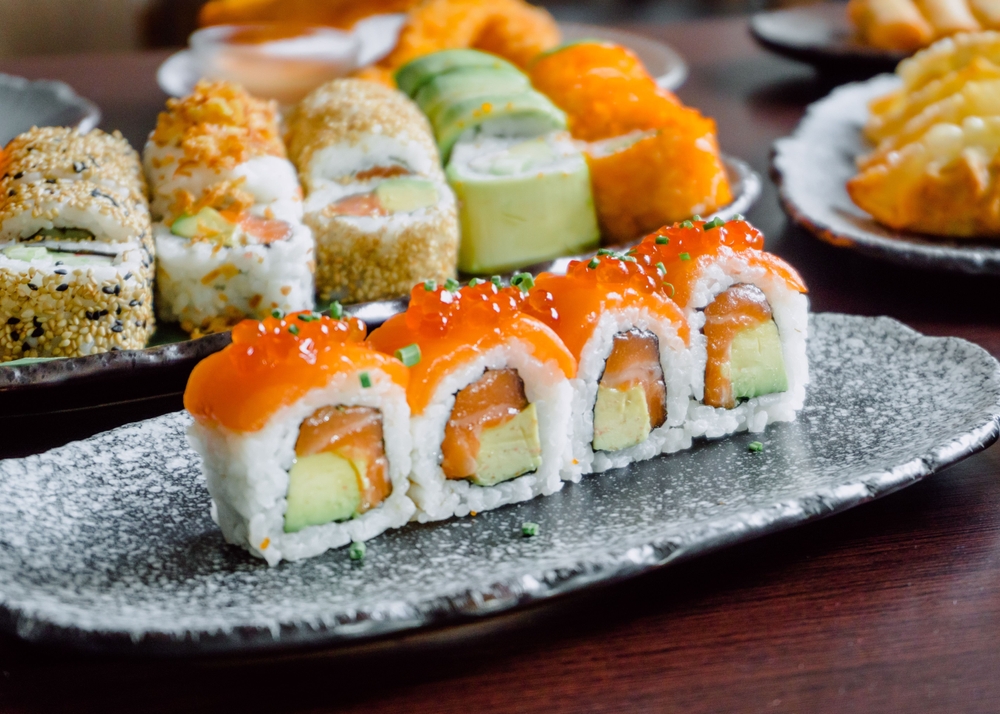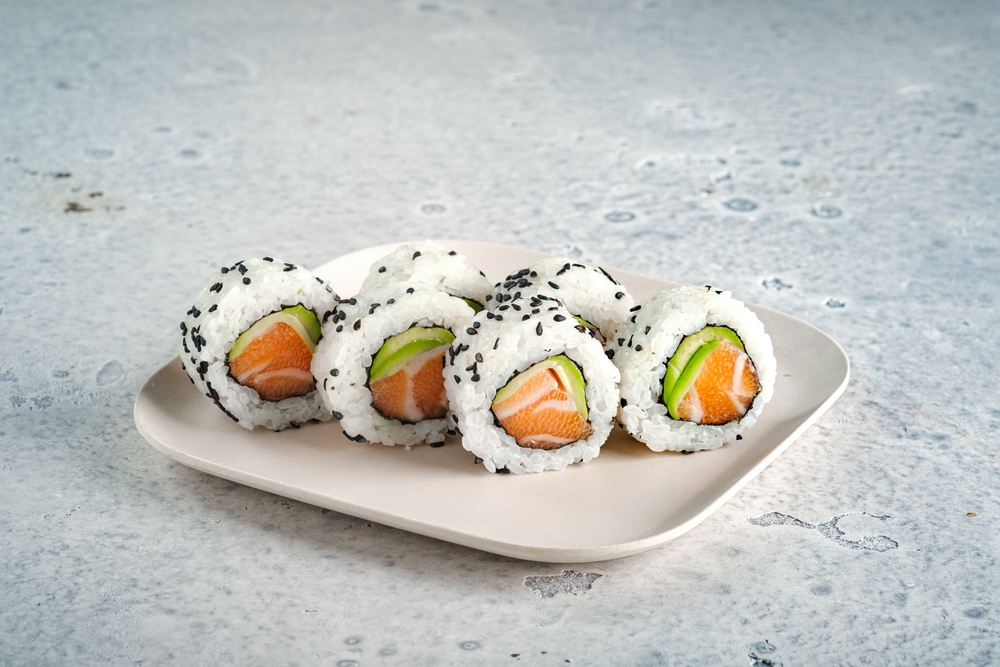- July 30, 2024
Can Dogs Have Sushi? Vet-Verified Facts & FAQ – Dogster

The information is current and up-to-date in accordance with the latest veterinarian research.
Your pet is one lucky dog if you’re wondering whether you can give your pet sushi. The sushi market has skyrocketed in recent years, with sales jumping over 23% from 2021 to 2022. People view it as a healthy alternative to fried foods or red meat. While we don’t usually associate fish and seafood with canines, your question is valid for its health value.
The word “sushi” often refers to the cold, cooked rice topped or rolled with fish, as well as nori and other ingredients. For our purposes, we are discussing plain rice topped with fish or seafood only, as many other rolls with various ingredients won’t be safe for pets to consume. So, dogs can only eat sushi if the protein is cooked and all the ingredients are plain. However, it’s not a cut-and-dry matter. There are caveats whenever you talk about giving canines human foods.
“Sushi” is such a broad term, and because of this, even though some sushi is safe for pets, it’s best to avoid it altogether because many rolls contain dangerous ingredients. However, it’s worth noting that the American Veterinary Medical Association (AVMA) does not recommend giving pets any raw animal-based proteins, including sushi. We defer to their advice.

Why Can Dogs Eat Sushi?
Many of the reasons why dogs can eat sushi are the same for you. Many varieties are low in calories and fat. If cooked and made without harmful ingredients, it isn’t dangerous to canines and may provide some health benefits. Sushi isn’t processed food, which is another point in its favor. It comes in convenient small pieces, making controlling how much your dog is getting easy. Due to its rising popularity, you can get it freshly prepared at many grocery stores.

Benefits of Feeding Sushi to Dogs
Most of the fish used in sushi are considered healthy. For example, tuna and salmon are rich sources of omega-3 fatty acids, phosphorus, and potassium. They are also relatively low in calories. A piece of tuna sushi contains only 35 calories, whereas salmon has 37.4 calories. The rice makes up the bulk of these amounts. Undoubtedly, these are reasons you may eat it. Nonetheless, risks also exist on both fronts.
The Downside of Feeding Sushi to Dogs
We alluded to one con of feeding your dog sushi in the introduction. You have one pampered pooch if sushi is on the menu because it can be pricey, depending on the type. One piece is unlikely to satisfy many pets’ appetites. That makes calories potentially problematic, especially with small pups. For example, a 10-pound dog should only get around 300-340 calories per day. A couple of pieces can make quite a dent without providing complete nutrition.
Treats like sushi should only make up 10% of your pup’s daily caloric intake. Any more risks causing weight gain and obesity.
Salt
Salt is the elephant in the room with sushi because of the sodium content in the protein and the soy sauce. For example, a piece of salmon sushi contains 111 milligrams, while tuna has 107 milligrams. While a certain amount of salt is necessary for good health, you can have too much of a good thing. The minimum dietary requirement for canines is 5 milligrams of sodium per kilogram of body weight per day, and the National Research Council (NRC) recommends a minimum daily intake of 13.3 milligrams per kilogram of body weight. To put that into perspective an adult dog weighing 33 pounds only requires about 200 milligrams of sodium per day.
And that’s just the fish. Let’s consider the soy sauce, which most people dunk their rolls in. A tablespoon contains 878 milligrams of sodium. The low-sodium products don’t fare much better at 511 milligrams. Humans use soy sauce because it tastes good. However, it doesn’t matter to dogs because their taste buds are fairly insensitive to salt. Nevertheless, toxicity can occur with as little as 2 to 3 grams per kilogram of body weight. Signs include the following:
- Vomiting
- Weakness
- Diarrhea
- Muscle tremors
- Seizures
It can also increase your pet’s blood pressure. Excessive salt is particularly problematic for dogs with renal disease. Poisoning can be fatal if the dog consumes over 4 grams per kilogram of body weight.

Wasabi
Not everyone enjoys the pungency of wasabi, which is almost always served on the side of a sushi roll. Some don’t like how its heat tickles their nose. Your dog is probably in this camp. Wasabi adds a wild card to the mix since some sushi preparations include the heat of the Japanese horseradish for a flavor boost. We mentioned that plain, cooked sushi is all right for canines. That means no wasabi!
Dogs don’t have experience with these types of foods, making them off-putting or even painful to some animals. At the very least, it will shock your pooch. Your pet may drool, sneeze, or paw at their face and snout. Remember that it won’t take much to cause these reactions in a dog that has never eaten wasabi. Ingestion can lead to digestive upset in sensitive animals.
Fat Content
The fat content of many fish and seafood used for sushi is low, making them a healthy option for people. Some rolls may contain ingredients like cream cheese or avocado. Both have significant amounts of fat, which can negate any nutritional value. While the latter can cause GI distress in dogs, avocado toxicity is a greater concern for birds, horses, and goats. However, calories are still an issue for weight gain and obesity.
Allergies
Dogs are more likely to be allergic to animal-based proteins than grains. Dairy, beef, and chicken are the common allergens. Grains rarely cause issues. However, it is still possible. It’s another reason to avoid soy sauce since some products contain wheat. Of course, anything could be a potential allergy trigger. Common signs of food allergies in canines include gastrointestinal issues such as vomiting and diarrhea, and itchy skin.

Foodborne Illnesses and Parasites
Raw fish always carries the risk of foodborne illnesses and parasites, even in sushi-grade products. Salmon poisoning, caused by the bacteria Neorickettsia helminthoeca, is fatal in dogs if untreated. However, the risks from raw fish also apply to you, making this point a general caution for any person or animal consuming these foods. Proper storage and preparation are imperative with any raw food.

How to Feed Your Dog Sushi
You should only give your dog plain, cooked sushi with minimal ingredients. Make sure the food and the preparation don’t include unsafe ingredients, such as onions and garlic. It doesn’t take much to cause an adverse reaction. We don’t recommend making it a regular part of your dog’s diet. However, you can offer your pooch a small bite on very rare occasions, heeding our cautions about sushi.

Frequently Asked Questions (FAQ)
Is It Safe for My Dog to Eat Rice?
Rice is a common ingredient in many commercial dog foods. Most pets don’t have any issues digesting it. However, if it’s the first time they’ve eaten it we recommend giving your dog a small amount and observing their reaction before giving it to them again.
Is Nori Safe for Dogs?
Nori, or edible seaweed, is non-toxic to dogs and as long as it is plain and unseasoned it is generally safe in small amounts. Dogs that are being treated for any thyroid issues should not eat seaweed due to the iodine it contains.
What Are the Signs of a Problem With Sushi?
Vomiting and diarrhea are the most common red flags. Signs of salt toxicity, though rare, may take a few hours to appear. A sudden onset of these indicators can point to accidental poisoning.


Conclusion
We understand wanting to share your sushi with your pooch. It’s delicious! However, navigating these waters is somewhat challenging. Knowing how the food is prepared is essential for spotting the red flags, like wasabi and soy sauce. A small piece probably won’t hurt your pet, but it shouldn’t be a significant part of your pet’s diet. We suggest discussing the issue with your vet if you have concerns.
Featured Image Credit: Wirestock Creators, Shutterstock
Tags
What do you think?
Related Articles

New Puppy Checklist: Gear You’ll Need for Your New Dog
Getting a new puppy is really exciting, but before you welcome them home, it’s important to prepare your space for them. Since puppies need a

How Big Do Mini Poodles Get? Vet Reviewed Average Weight & Growth Chart – Dogster
The information is current and up-to-date in accordance with the latest veterinarian research. Learn more » When you buy a Miniature Poodle, you might not

Can Police Dogs Smell Nicotine? Vet Verified Facts & Info – Dogster
The information is current and up-to-date in accordance with the latest veterinarian research. Learn more » While cigarette sales have been declining steadily for decades,

How Old Is 5 in Dog Years? Vet-Approved Guide to Each Size of Dog – Dogster
The information is current and up-to-date in accordance with the latest veterinarian research. Learn more » A common method for calculating a dog’s age is

